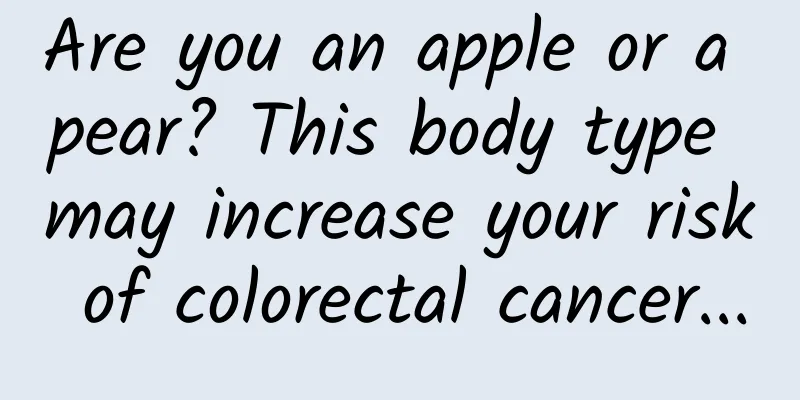Are you an apple or a pear? This body type may increase your risk of colorectal cancer...

|
Compiled by: Gong Zixin Colorectal cancer is the third most common cancer and the second leading cause of cancer death worldwide, with more than 1.9 million cases and nearly 1 million deaths in 2020. Evidence suggests that people who are overweight or obese (BMI ≥ 25 kg/m²) are at higher risk of colorectal cancer. Waist circumference, hip circumference, and waist-to-hip ratio represent surrogate markers of body fat distribution and, similar to BMI, have been shown to be associated with colorectal cancer risk but do not provide additional insights into colorectal cancer etiology or risk discrimination. Joint consideration of these anthropometric characteristics could provide information on the role of body size in cancer development and further understand how obesity subtypes are associated with differential colorectal cancer risk. Recently, a large international medical research team evaluated the body shape and genetic predisposition of tens of thousands of people to understand the risk of colorectal cancer. The results found that people with ordinary obesity and tall "apple" shaped bodies are more likely to develop colorectal cancer than people with other body shapes. The study was published in the journal Science Advances. In 2016, a group of researchers proposed a promising method for defining body size that could provide insights into the role of body size in the development of colorectal cancer. The method was derived from data from 170,000 individuals of European ancestry and was based on principal component analysis of six anthropometric traits (BMI, weight, height, waist circumference, hip circumference, and waist-to-hip ratio). In observational analyses, two distinct and orthogonal body types, characterizing general obesity and tall central obesity, were both strongly positively associated with colorectal cancer risk. These preliminary findings need to be replicated in different study populations and their potential causal basis evaluated. In addition, the development of colorectal cancer is characterized by various genetic and molecular changes, and body type may play a role through this unique but currently unknown molecular pathway. To this end, in this new study, the research team conducted a similar study in a larger population.
The study, the largest of its kind to date, involved collecting and studying data from 550,000 adults recorded in the UK Biobank. It also looked at genetic data from tissue samples collected from a further 800 donors. The research team found that tall people with an "apple" shape are more likely to develop colorectal cancer than people with other genetically encoded body types. An "apple" shape means that their genes tend to increase weight around the waist. The research team also found that tall, apple-shaped people tend to have more health problems related to the digestive system. In addition, ordinary obese people who are prone to becoming obese due to unhealthy diets are also more likely to develop colorectal cancer. The researchers noted that a generally obese body type was associated with gene expression patterns in tissues with a high proportion of neural cells, while a tall, centrally obese body type was associated with gene expression patterns in mesenchymal cells. This suggests that these two different body types may act through different downstream molecular pathways, which in turn affect colorectal cancer risk. The cover image and images within this article are from the copyright gallery (or copyright holder). Any reproduction or use may lead to copyright disputes. |
<<: Who can resist a bird that can “speak human language” and “play golf”!
Recommend
Don’t eat! Don’t eat! Don’t eat! Official important reminder
Important reminder! Delicious looking wild mushro...
Which platform brings the best returns for posting short videos?
Nowadays, short videos have become a traffic entr...
Do you want to be on the trending list? Read this before deciding
If a product with good ASO is like a famous celeb...
Why do people who send group wishes have an "empathy defect"
I looked at the mass blessings bombarding me with...
Apollo convenes the second Xiong'an Council. Zhang Yaqin: Join hands with multiple parties to explore future intelligent transportation
As a model room for future urban life, Xiongan Ne...
2019 Fliggy 3rd Anniversary Event Planning and Promotion Plan!
This article mainly wants to share with you my pe...
How to organize activities with 0 budget and still attract and retain a large number of users!
I. Introduction, my understanding of activities 1...
5 core strategies for rapid growth of Taobao stores
For brands that have just started their business,...
HD, UHD, 4K, 8K... How do you differentiate between these resolutions?
In today's digital age, video has become an i...
A guide to Tik Tok account positioning, content and monetization!
I often see other people’s short video accounts w...
The secrets of Xigua Video’s recommendation mechanism revealed!
To understand the recommendation mechanism, we mu...
3 charts to master the methods of marketing promotion and implementation planning
In marketing promotion , we can use various model...
Baidu information flow advertising in 7 major industries
This article cites cases from seven popular indus...
Android-menudrawer-master open source powerful sidebar menu
Source code introduction There are different styl...
How to monetize TikTok? 6 cash-out modes!
Any operation that cannot be monetized and lacks ...









